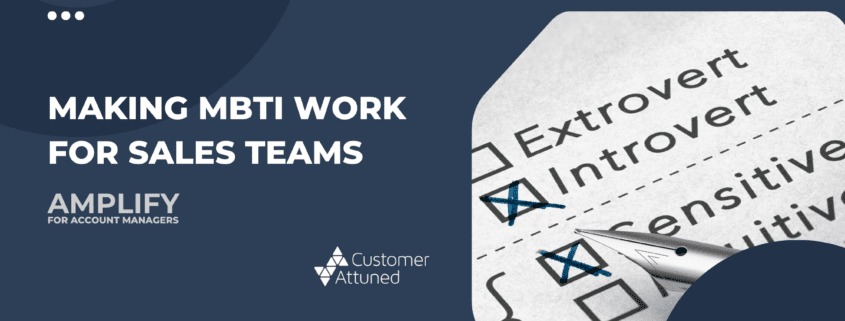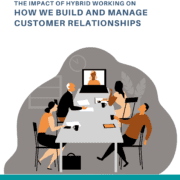Making MBTI Work For Sales Teams
Making MBTI Work For Sales Teams. The Myers Briggs Type Indicator (MBTI) is the most widely used assessment of psychological type and an enormously insightful tool when understood and applied well.
We recently shared a post on SDI – Strength Deployment Inventory called “The Power of SDI in B2B Sales” used in training and development, and we wanted to re-share this post on MBTI, as a reminder of how personality tests are a key component to understanding how you as an individual have the ability to build client relationships and equally, as a team leader of sales and account managers, understanding how each of your team has the ability to build relationships. Not everyone will have the same style or personality trait, and once you know how your team operate individually, you can lead and guide them better.
Our new training and development programme AMPLIFY is a practical, immersive programme designed to explore the concept of Trust in the B2B environment, exploring and deploying a number of key tools, including personality testing such as SDI and MBTI which can help Account Managers identify and unlock greater mutual value – thereby creating relationships that your competition can’t replicate and giving you real competitive advantage. To learn more about it, click here.
Read the full blog below and subsequent parts 1 and 2 linked below, as a reminder of the importance of knowing your team and what makes them tick.
How well do you know your team?
This and two further posts on MBTI for sales teams are a part of our Sales and Account Management expertise and illustrate ways in which we help you to get the very best from your customer-facing teams.
In our work with many sales organisations we find that whilst MBTI is used effectively for the personal understanding/awareness of team members [their natural style, way of working, strengths and likely weaknesses, reaction when under stress etc] and for good team working [examining how the differing types act when in team situations and in particular how they cooperate with others to achieve tasks], the value adding piece of the jigsaw which is missed is the application of MBTI thinking to customers and the subsequent flexing of selling style to better build rapport and customer relationships.
In this series of short papers we will consider each of the four MBTI scales –
- Extraversion to Introversion
- Sensing to Intuition
- Thinking to Feeling
- Judging to Perceiving
..and for each we will consider the following critical questions for sales –
- How do we spot this characteristic with confidence
- What selling style/techniques will a customer with this style type best respond to
- How should we communicate to better ‘connect’ with a customer of this type
When applied well, the combination of a number of relatively small ‘flexes’ of style leads to a significantly faster build of rapport and trust with customers and has been shown to SIGNIFICANTLY IMPROVE SALES OUTCOMES. Training your sales team to apply MBTI will provide a significant and measureable ROI within months of completion.
Let’s first consider the Extraversion to Introversion scale –
Before we begin one point must be stressed – extraversion and introversion are the most commonly misunderstood concepts within MBTI. Extraversion is NOT about being a loud, larger-than-life, dancing-on-the-tables character type and Introversion does not signify that an individual wishes to live a solitary existence on a remote Hebridean island!
Extraverts are fundamentally people who take energy from social interaction – so at the end of a long hard day an extravert will recharge their batteries through socialising in some way. They will also enjoy large social groups – perhaps choosing to holiday with friends and/or extended family.
Introverts are not ‘shy’ – they are individuals who expend energy in social interaction. Introverts who need to recharge their batteries do so from within themselves – hence an introvert at the end of a long day is likely to seek out peace and quiet to reflect. Introverts are likely to find large social groups [over extended periods of time] exhausting and hence are likely to prefer holidaying with immediate family only.
So…to our three key questions
-
Spotting customers’ preferred type or style –
Below outlines things to look for when trying to spot extraverts and introverts –
Extraverts:
- Enjoy team sports – football, rugby
- Seek out larger social groups – lunch at a table for 6+
- Are happy to be the centre of attention – often the focus of conversation
- Speak quickly and with enthusiasm about passions
- Are likely to share personal details early in the relationship
- Have shorter attention spans – need a high energy approach or can become bored
- Use expressive body language – they fill the space
- Seek out opinions of many others
- Are physical – comfortable with others inside their personal space
Introverts:
- Enjoy individual sports – squash, golf
- Are more comfortable in smaller social groups – lunch for 2-4 will be more comfortable
- Prefer a more supportive role and not to be the group focus
- Communicate in a quieter more reflective manner
- Share limited personal information until trust has been established
- Are happy with and even crave the detail behind proposals
- Use controlled body language – smaller space
- Use personal reflection
- Like personal space to be respected
The above list is by no means exhaustive – look for other ‘clues’ in speech, body language and social preferences to help you.
2. Effective selling to extraverts vs introverts
Utilise the guidelines below when selling –
For Extraverts:
- Keep presentations/pitches shorter
- Use pictures/visuals more than words
- Keep your personal energy high
- Express obvious belief in what you are selling
- Vary your tone – regular high energy injections are critical to maintain engagement
- Get them involved in developing the solution
- Forget pre-meeting work
- Close early – sale can be very fast
For Introverts:
- Provide the detail
- Provide evidence – words supported by pictures
- Remain calm and paced
- Focus on quiet credibility
- Consistent authoritative tone/delivery
- Provide ‘expert opinion’
- Send pre-work/reading in advance
- Provide time for reflection – they may genuinely ‘want to sleep on it’
3. Communicate better to connect more effectively
For Extraverts:
- High energy
- Faster pace
- Repeat carefully chosen motivational words [often focussed on major customer benefits]
- Focus on simple ‘storyline’
- Focus on outcomes
For Introverts:
- Calm Clear
- Regular/slower pace
- The devil is in the detail
- Fact/evidence based
- Credible references and quotes matter
- Outline processes impacted
A word of caution – look for congruence in customer communications – sales people need to find several clues to type before deciding on their flexing.
In our MBTI training we simulate both the spotting of types in ‘real-world’ situations and the flexing of delivery to better connect with customers.
In the next article we will consider the Myers Briggs Sensing to Intuition scale and how knowledge of your customers type can allow flexing of selling style.
Have a view on this? Tweet to @customerattune
Contact us at hello@customerattuned.com
Read more about:
- MBTI for Sales Teams Pt 2
- Myers Briggs Type Indicator for Sales Pt 3
- Customer Attuned’s Training and Development Programmes
- AMPLIFY – Competitive advantage through trust-based relationships
- It Takes Two To Tango - May 20, 2025
- Leveraging MBTI to build successful B2B relationships - October 25, 2024
- Making MBTI Work For Sales Teams - September 25, 2024





